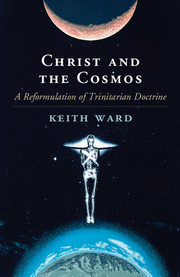Book contents
- Frontmatter
- Contents
- Preface
- Acknowledgements
- PART I THE THREEFOLD NATURE OF THE DIVINE BEING
- PART II THE BIBLICAL SOURCES OF TRINITARIAN THOUGHT
- PART III THE TRINITY, IMMANENT AND ECONOMIC
- PART IV THE SOCIAL TRINITY
- 22 Persons and Substances
- 23 The Idea of a Personal and Free Creation
- 24 The Logical Uniqueness of Persons
- 25 The Divine Nature and Freedom
- 26 Freedom in God and in Creatures
- 27 Persons as Necessarily Relational
- 28 An Ontology of the Personal?
- 29 Intra-Trinitarian Love
- 30 Infinite Gods
- 31 Divine Love and Necessity
- 32 Love and Alterity
- 33 Trinity versus Monotheism
- 34 The Passion of Christ
- 35 God and Abandonment
- PART V THE COSMIC TRINITY
- Bibliography
- Subject Index
- Name Index
33 - Trinity versus Monotheism
from PART IV - THE SOCIAL TRINITY
Published online by Cambridge University Press: 05 September 2015
- Frontmatter
- Contents
- Preface
- Acknowledgements
- PART I THE THREEFOLD NATURE OF THE DIVINE BEING
- PART II THE BIBLICAL SOURCES OF TRINITARIAN THOUGHT
- PART III THE TRINITY, IMMANENT AND ECONOMIC
- PART IV THE SOCIAL TRINITY
- 22 Persons and Substances
- 23 The Idea of a Personal and Free Creation
- 24 The Logical Uniqueness of Persons
- 25 The Divine Nature and Freedom
- 26 Freedom in God and in Creatures
- 27 Persons as Necessarily Relational
- 28 An Ontology of the Personal?
- 29 Intra-Trinitarian Love
- 30 Infinite Gods
- 31 Divine Love and Necessity
- 32 Love and Alterity
- 33 Trinity versus Monotheism
- 34 The Passion of Christ
- 35 God and Abandonment
- PART V THE COSMIC TRINITY
- Bibliography
- Subject Index
- Name Index
Summary
Moltmann has other arguments for social Trinitarianism too. His most provocative is his condemnation of monotheism as theologically, morally, and politically harmful. It is certainly a startling thought that monotheism is opposed to Trinitarian theism, but it is a thought he repeats a number of times.
Moltmann frequently says that belief in one God leads to belief in one all-determining ruler, which leads to hierarchical, patriarchal, and dictatorial views in politics and church organisation, and is opposed to true Christian belief in the equal freedom of all, where a true concern for and service of others will mark a truly democratic and humane society. ‘Monotheism’, he writes, ‘was and is the religion of patriarchy’ (Moltmann, 1981, p. 165). But if we believe in a Trinitarian God, in which belief no person will be superior to another and where all give themselves in love to the others, we will, he claims, have a much better model for human social relations.
The move from theological doctrine to political programme seems much too quick. Is there any reason to think that belief in one knowing/acting divine subject has any logical connection at all with belief that there should be one dictator with unlimited powers in human societies? The one divine subject might well issue orders that, since God is the only source of all authority, no human being is to set themselves in absolute authority over others. Perhaps, such a God may say, humans are so fallible and quarrelsome that none of them should ever claim supreme authority to interpret the will of God. All should have humility before the mystery of God, and it may be forbidden for anyone to claim to stand in the place of God and assume absolute authority over other ‘miserable worms’. I am not asserting that God does say that, though there are certainly forms of Islam that do. I just cannot see any logically valid way to infer from ‘There is only one God’ that ‘There should be only one absolute ruler in human societies’.
In any case, if you were looking for a logical link between religious beliefs and political organisations, you might think that radical polytheists were more likely to be democratic than Trinitarians.
- Type
- Chapter
- Information
- Christ and the CosmosA Reformulation of Trinitarian Doctrine, pp. 204 - 206Publisher: Cambridge University PressPrint publication year: 2015



